The longevity of dental implants is a crucial aspect to consider for anyone seeking tooth replacement options. Dental implants are not only a popular choice among patients but also offer numerous benefits when compared to traditional dentures and bridges. Understanding the factors that contribute to the longevity of dental implants can greatly influence your decision-making process, ensuring you make an informed choice for your oral health.
Introduction
Dental implants have revolutionized the field of dentistry by providing a reliable solution for tooth loss. They consist of titanium posts that are surgically inserted into the jawbone, serving as artificial roots for replacement teeth. The significance of their longevity cannot be overstated; after all, investing in dental implants is not just about immediate aesthetics but about long-term functionality and well-being.
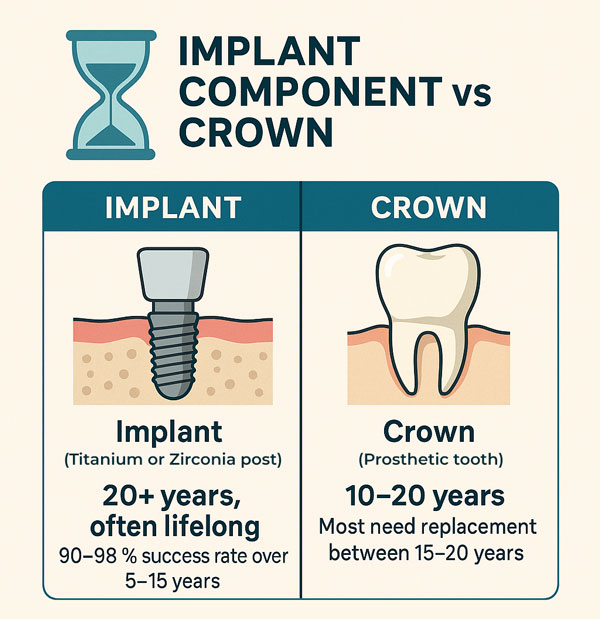
When we talk about the longevity of dental implants, we refer to how long these implants can remain functional and effective for the patient. This article aims to provide comprehensive insights into this topic while comparing dental implants to other tooth replacement options, particularly focusing on durability.
In contrast to traditional dentures or bridgework, which may require replacements every few years, dental implants can last for decades with proper care. This makes them a preferable option for many individuals seeking a long-term solution to tooth loss.
How long do dental implants last?
Understanding how long dental implants last is essential for prospective patients. Studies suggest that dental implants can typically last anywhere from 10 to 30 years or even longer, depending on various factors.
Typical lifespan range: 10 – 30 years or more
While the average lifespan of dental implants is estimated at around 10 to 15 years, many patients report that their implants last significantly longer, sometimes surpassing 20 years.
Implant longevity depends largely on the type of implant, the health of the surrounding bone, and the patient’s oral hygiene practices. With modern advancements in material technology and surgical techniques, it’s not uncommon to see implants that last over three decades.
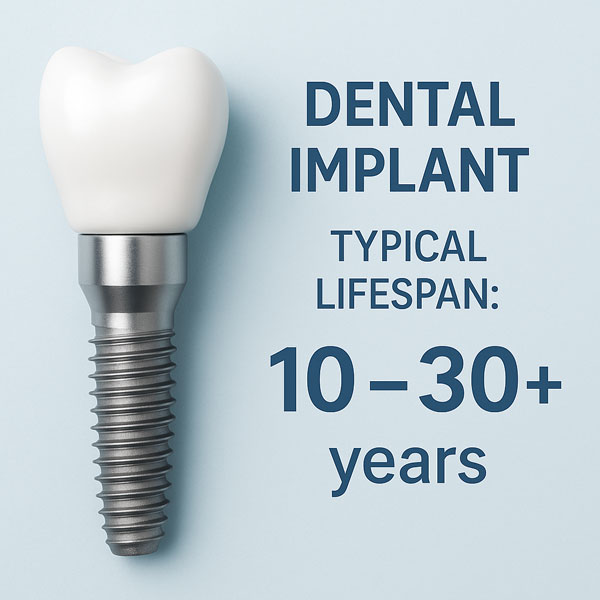
What studies and clinical data show about implant survival rates
Numerous clinical studies have explored the survival rates of dental implants. A systematic review published in reputable dental journals indicates that the success rate of dental implants stands at approximately 95% after five years and about 90% after ten years.
Factors influencing these figures include:
- Type of implant: Different designs and materials may lead to varied success rates.
- Patient factors: Individual health conditions and lifestyle choices play a significant role.
The difference between individual implants and full-mouth restorations
Individual implants tend to have higher success rates compared to full-mouth restorations, commonly known as implant-supported dentures or the All-on-4 system. In scenarios involving multiple implants, the complexity increases, potentially affecting overall longevity and maintenance strategies.
Full-mouth restorations often require meticulous planning and execution, making it vital for patients to work closely with skilled dental professionals to ensure optimal outcomes and longevity.
Key factors affecting the longevity of dental implants
While dental implants are designed to withstand the test of time, several key factors dictate their actual longevity. Understanding these factors can help you ensure that your investment pays off in the long run.
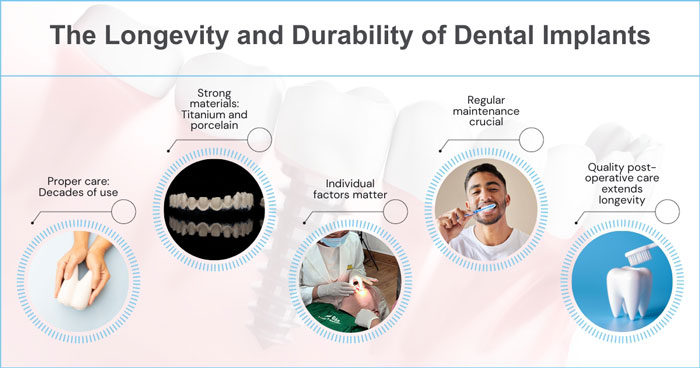
Oral hygiene and regular maintenance
One of the cornerstones of implant longevity is diligent oral hygiene. Patients must adopt a comprehensive oral care routine that includes:
- Regular brushing and flossing: Maintaining good oral hygiene can prevent infections that could compromise implant stability.
- Professional cleanings: Visiting your dentist for regular cleanings helps identify potential issues early on.
Neglecting oral hygiene can lead to peri-implantitis, an inflammatory condition that poses a significant risk to the longevity of your implants.
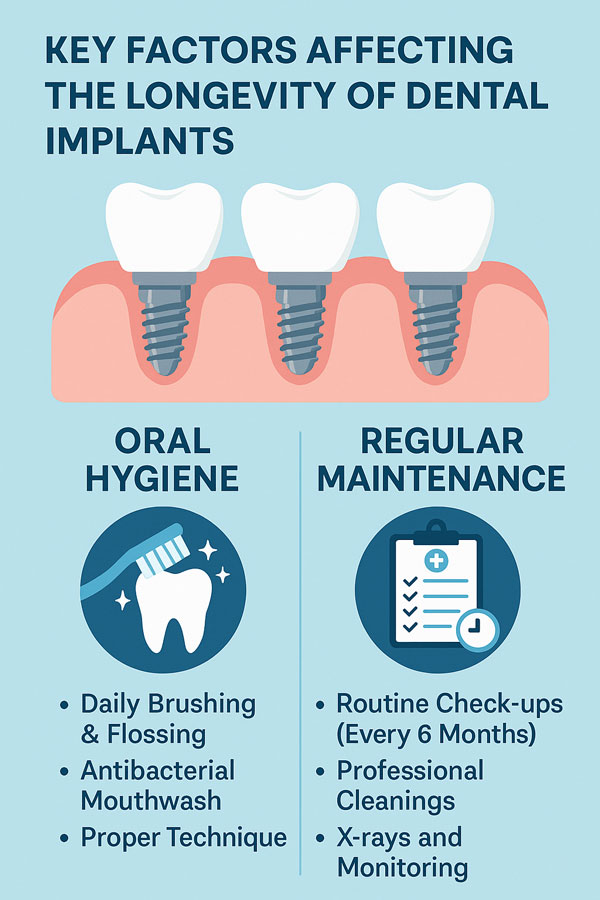
Bone quality and quantity
The quality and quantity of the jawbone play a pivotal role in determining the success of dental implants. Adequate bone density is necessary to support the implant effectively. Key considerations include:
- Bone grafting procedures: If the existing bone is insufficient, bone grafting may be recommended to improve implant support.
- Osteoporosis: Conditions like osteoporosis can weaken the bone and affect the success of implants.
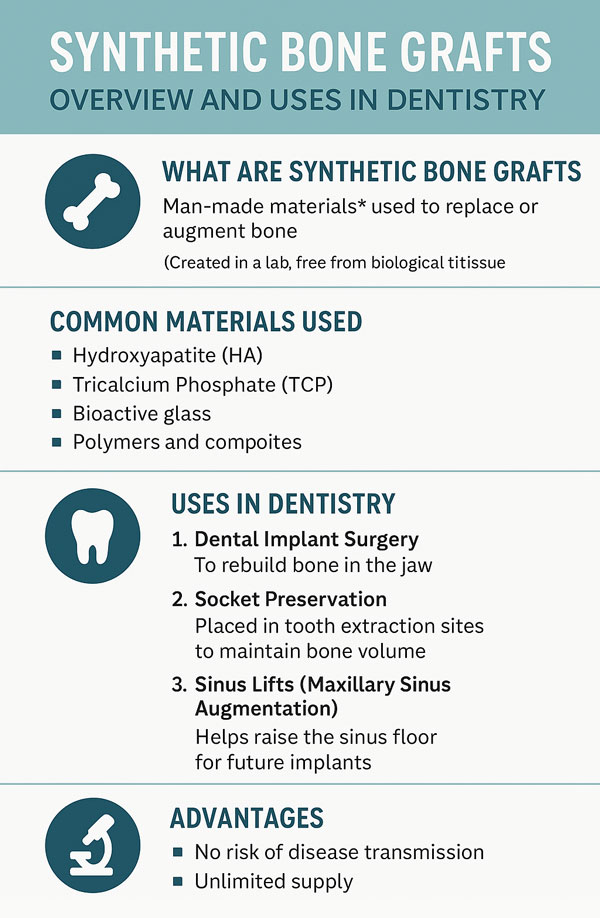
Patients should consult their dentists about bone assessments before undergoing implant surgery.
Implant Type, Design, and Material
The choice of implant type can directly impact its longevity. Modern implants come in various designs and materials, each with unique advantages.
Titanium remains the gold standard due to its biocompatibility and strength. However, newer materials such as zirconia are gaining popularity for specific applications.
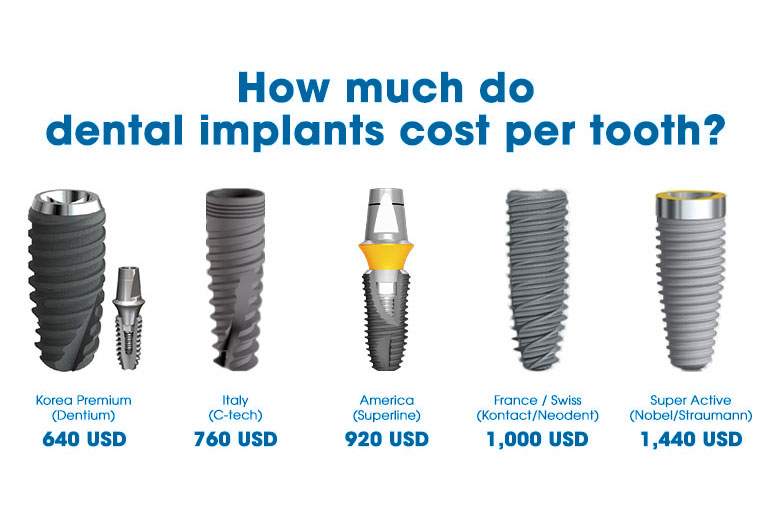
Additionally, implant surface treatments (e.g., roughened surfaces) can enhance osseointegration—the process of bone integrating with the implant—thereby contributing to improved longevity.
Overall patient health (e.g., Smoking, Diabetes)
A patient’s overall health is a critical factor that can affect the longevity of dental implants. For instance:
- Smoking: Impairs blood flow, leading to delayed healing and increased risk of complications.
- Diabetes: Poorly controlled diabetes can hinder healing processes, increasing the likelihood of implant failure.
Patients should engage in open discussions with their dental professionals regarding pre-existing conditions and lifestyle habits to develop strategies aimed at maximizing implant longevity.
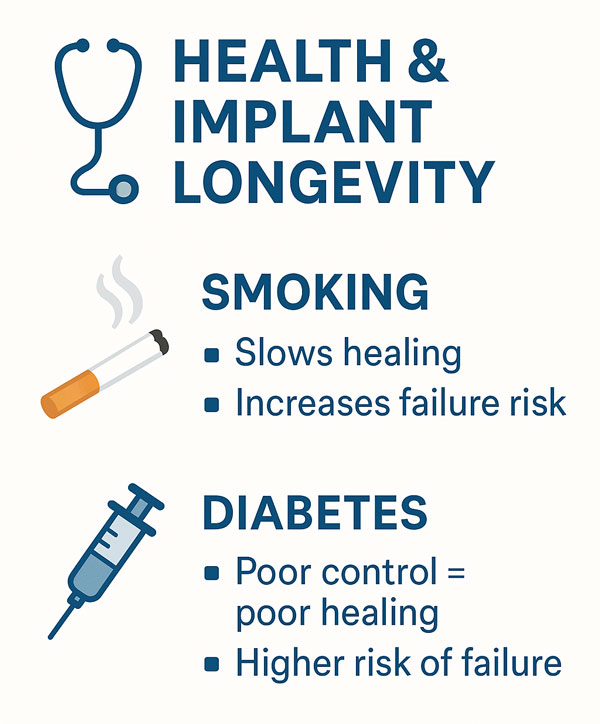
Skill and experience of the dental surgeon
The expertise of the dental surgeon conducting the implant procedure is paramount. A skilled professional will meticulously evaluate individual cases, plan accordingly, and execute the placement with precision. Factors to consider include:
- Reputation and experience: Researching the surgeon’s background and past outcomes can provide peace of mind.
- Technology used: Advanced imaging technologies can enhance treatment planning and accuracy.
Selecting a qualified and experienced dental professional is essential for ensuring successful implant placement and maximizing the longevity of the dental implants.
Longevity of All-on-4 dental implants
All-on-4 dental implants have gained traction as an innovative solution for patients needing extensive restoration due to multiple missing teeth. This section delves into the longevity of this particular system.
Overview of the all-on-4 concept and how it differs from traditional implants
The All-on-4 concept involves placing four strategically positioned implants in the jaw to support a full arch of prosthetic teeth. Unlike traditional implants that may require one implant per missing tooth, All-on-4 provides a more cost-effective and less invasive alternative.
This method capitalizes on the available bone structure and minimizes the need for bone grafting, thereby simplifying the surgical process.
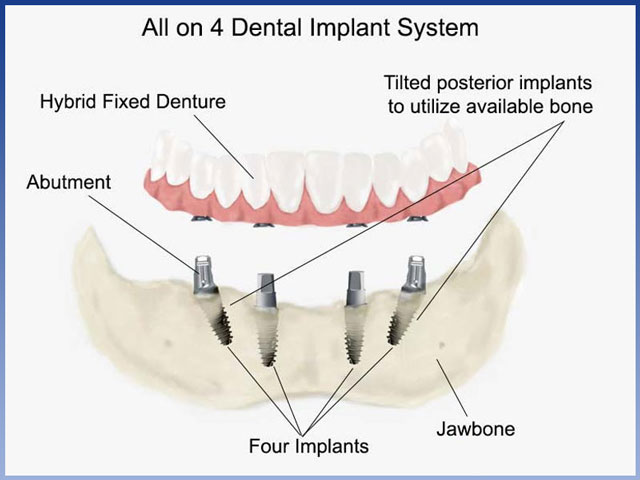
Typical lifespan of All-on-4 systems
Research indicates that the longevity of All-on-4 systems tends to mirror that of traditional implants, with a success rate ranging between 90% to 95% over the first decade. However, factors such as the patient’s oral hygiene and adherence to maintenance protocols significantly influence these outcomes.
Maintenance requirements to prolong their effectiveness
To maximize the longevity of All-on-4 dental implants, patients should adhere to specific maintenance guidelines, including:
- Daily oral care: Brushing and flossing around the prosthetic teeth is crucial for preventing plaque accumulation.
- Routine dental check-ups: Regular appointments allow for early detection of potential issues and professional cleanings.
- Avoiding harmful habits: Habits such as smoking or excessive alcohol consumption can adversely affect implant success rates.
By implementing these practices, patients can enjoy the aesthetic and functional benefits of All-on-4 dental implants for an extended period.
All on 4 dental implants price at Saigon Implant Center:
| ALL ON 4 + RESTORATION | DENTAL IMPLANTS COST (USD) | DISCOUNT PRICE (USD) |
| Implant ALL ON 4 Dentium (Korea) (Include screw only + Temporary strengthened crown) | 6,000 | 4,000 |
| Implant ALL ON 4 Straumann Neodent (Swiss) (Include screw only + Temporary strengthened crown) | 7,000 | 5,200 |
| Implant ALL ON 4 Nobel / Straumann SLA Active (Include screw only + Temporary strengthened crown) | 9,000 | 7,200 |
| Final bar + High Acrylic Permanent teeth (4–6 Months Later) | 1,400 | |
| Final bar + Full Zirconia CAD/CAM teeth (4–6 Months Later) | 4,000 | |
|
For patients deciding on Implants All-On treatment SAIGON CENTER DENTAL CLINIC will give customers a gift package, including: |
|
|
Longevity of dental implant dentures
Implant-supported dentures represent another advancement in tooth replacement technology, offering greater stability than traditional removable dentures.
Explanation of Implant-Supported Dentures vs. Traditional Removable Dentures
Traditional removable dentures rely on the gums for support, leading to discomfort and reduced chewing efficiency. In contrast, implant-supported dentures anchor securely to dental implants, enhancing both function and comfort.
How long do implant dentures last
Similar to conventional implants, the longevity of implant-supported dentures tends to range from 10 to 20 years, contingent upon factors such as:
- Material selection: High-quality denture materials ensure durability and resistance to wear.
- Oral hygiene practices: Maintaining cleanliness is vital for preserving both the dentures and the underlying implants.
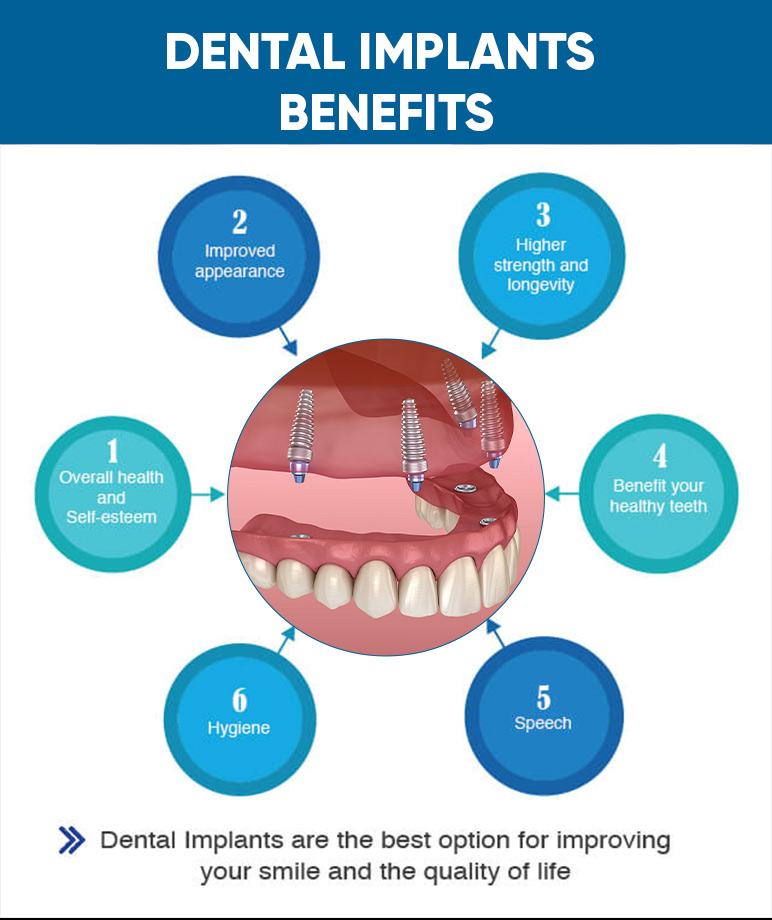
Benefits, Limitations, and best care practices
The primary benefits of implant-supported dentures include improved stability, enhanced chewing ability, and preserved facial structure. However, there are limitations, such as the initial cost and necessity for surgical intervention.
Best care practices encompass:
- Cleansing routines: Regular cleaning of both the dentures and the implants is necessary to prevent infections.
- Periodic evaluations: Frequent dental visits are essential for monitoring the integrity of the implants and dentures.
Adhering to these best practices can significantly improve the longevity and efficacy of implant-supported dentures.
Tips to maximize the longevity of your implants
Maximizing the lifespan of your dental implants requires proactive measures. Below are several practical tips to help you protect your investment.
What you can do daily to protect your implants
Developing a daily oral care routine is paramount. Here are some strategies to consider:
- Brushing: Use a soft-bristled toothbrush and non-abrasive toothpaste to clean around your implants and natural teeth.
- Flossing: Special floss designed for dental implants can effectively remove debris and plaque.
- Mouthwash: Using an antibacterial mouthwash can reduce harmful bacteria and prevent infections.
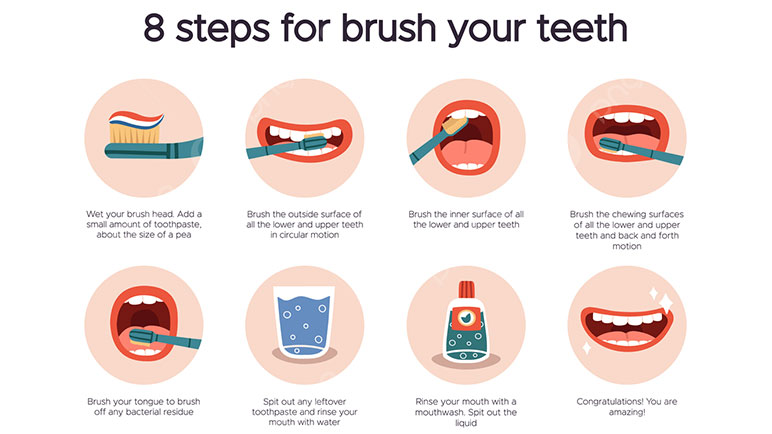
Importance of Regular Dental Visits
Regular dental check-ups are non-negotiable for maintaining optimal implant health. During these visits, your dental professional will examine your implants, perform any necessary cleanings, and address any concerns that may arise.
Lifestyle Choices That Enhance (or Reduce) Implant Success
Certain lifestyle choices can either bolster or undermine the success of dental implants. Consider the following:
- Nutrition: A balanced diet rich in vitamins and minerals supports oral health and healing.
- Hydration: Staying hydrated aids in saliva production, which plays a protective role against bacteria.
- Exercise: Regular physical activity encourages circulation, promoting healing and recovery.
Conversely, habits such as smoking or poor dietary choices can negatively impact implant longevity, emphasizing the importance of mindful living.
Conclusion
Understanding the longevity of dental implants is crucial for making informed decisions regarding tooth replacement options. Various factors including oral hygiene, bone quality, the skill of the dental surgeon, and overall patient health significantly influence implant success rates. Furthermore, knowing the specifics regarding the longevity of all-on-4 dental implants and dental implant dentures equips patients with the knowledge they need to prioritize their oral health responsibly. Ultimately, engaging in proper care practices and selecting experienced dental professionals can lead to long-lasting results and enhanced quality of life. Schedule a consultation with a dental implant specialist to assess your long-term options.

 Google Reviews
Google Reviews Call
Call
SAIGON IMPLANT CENTER
Best dentist in Vietnam
Saigon Implant Center - Dental Clinic utilizes the latest technology for specialized treatment in the field of Single implant, full jaw implants, All on 4 implants, All on 6 implants, Zygoma implant....
SAIGON IMPLANT CENTER
Best dentist in Vietnam
Saigon Implant Center - Dental Clinic utilizes the latest technology for specialized treatment in the field of Single implant, full jaw implants, All on 4 implants, All on 6 implants, Zygoma implant....